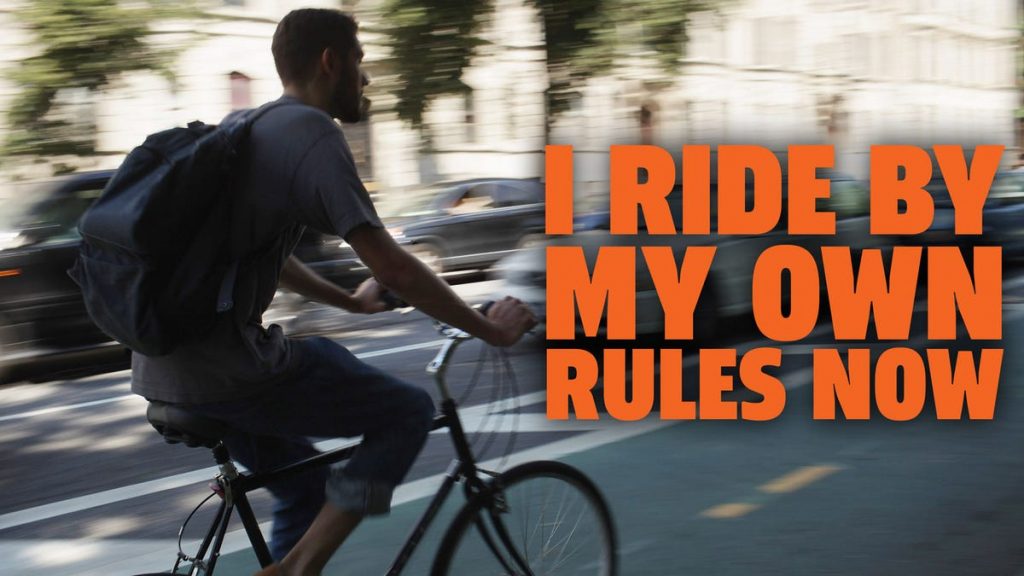It’s Totally Fine For Cyclists To Run Red Lights, Says Colorado

It’s one rule for them and another for everyone else. Photo: Spencer Platt (Getty Images)
Cycling’s great. It’s easily my favorite way to travel ‘round any big city as a) You don’t get stuck in traffic, b) It helps you figure out your way around the place, and c) You don’t have to ride a train full of covid. But some city-center cyclists give the rest of us a bad rap by running red lights. Well now, the State of Colorado has ruled that this is a totally fine thing to do.
We’ve all been there; you’re waiting at a red light or a stop sign and suddenly, a cyclist whizzes past you and into the intersection. If you’re in a car, you think to yourself, “they’re going to get themselves killed one day,” and if you’re on a bike you think “they’re giving the rest of us a bad name!”
Cyclists skipping stop signs and riding through red lights is a practice that transcends international boundaries. When I used to cycle through central London to get to work, people would always pass me, patiently waiting at a red light. And the same thing happens whenever I ride through NYC these days.
But now, cyclists in Colorado will have cause to skip stop signs as a new bill just passed the state senate that argues that it’s actually safer for bike riders to take the rules of the road into their own hands.
What could be the next state to launch similar legislation? Photo: Drew Angerer (Getty Images)
G/O Media may get a commission
26% Off
Arlo Pro 3 Camera System
Security upgrade
Comes with two security cameras that work with either Alexa or Google Assistant, can record 2K video, zoom in, and has excellent night vision.
The affectionately named Safety Stop Bill passed the full house and the full Senate floors in Colorado earlier this week. It now awaits the governor’s signature before it becomes law.
While the bill doesn’t outright stop cyclists from following the rules of the road, it does slightly alter what different signs and signals mean for those riding a bike in Colorado.
According to the bill, anyone riding a “low-speed conveyance” will now be able to treat stop signs as yield signs and stop lights as stop signs.
This means that as they approach a stop sign, riders should “slow to a reasonable speed” and yield the right of way to any traffic or pedestrians in the intersection before continuing through the intersection.
At a red light, riders must stop at the intersection and yield to any traffic or pedestrians, before continuing through.
And it isn’t just bikes that these new rules apply to. The bill covers all “low-speed conveyances,” which also includes electric bicycles, electric scooters, wheelchairs, skateboards and Onewheels.
What does this even mean anymore? Photo: thecrazyfilmgirl via Wikimedia Commons
While, at first, it might seem like an odd rule to enforce as it makes intersections a little more unpredictable, proponents of the bill argue that it actually makes them much safer for cyclists.
According to Bicycle Colorado, under the present rules 72.2 percent of reported crashes between bicyclists and drivers took place at intersections or were “intersection related.” But research shows that the Safety Stop Bill would reduce interactions between motorists and bike riders at intersections, which could in turn reduce the number of crashes at intersections.
The thinking behind it is that cyclists will spend less time waiting in the intersection, where they are more likely to be injured. The new rule is also said to increase the visibility of bike riders at intersections, which could also cut the number of crashes.
Once signed by the governor, the new law will come into effect across Colorado. However, it is already implemented in some places across the state such as Aspen, Berthoud, Englewood and Thornton.
Safety stop laws are also already in place in states including Idaho, Delaware, Oregon, North Dakota, Utah and Oklahoma.


